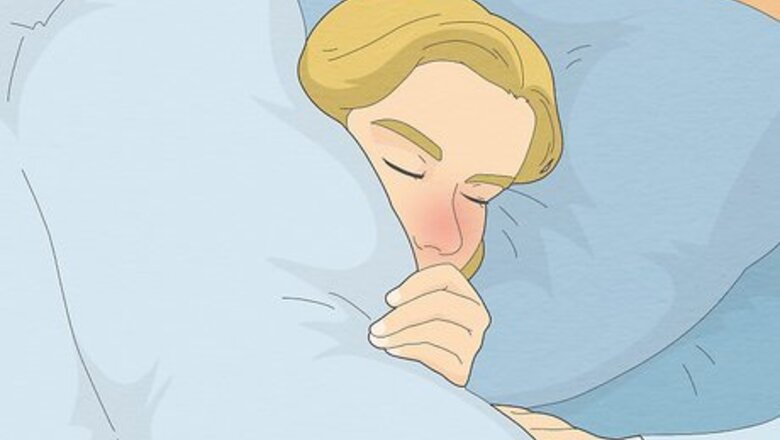
views
Relax during the day.
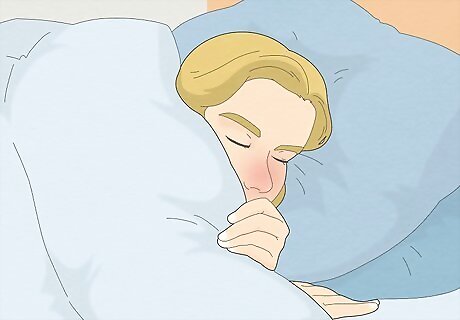
Your body needs rest to have the energy to fight off the cold. Commit to staying home while you're sick; don't go to work or school. Take the opportunity to curl up in your bed and focus on getting better! Put on your pajamas and relax. You could read, watch a show, or just take a nap. Work on de-stressing so your body has the energy it needs to heal. Don't feel bad about not going to school or work during a cold. It's the best decision for your health, and it's also a good idea to stay home so you don't spread the cold to other people!
Drink lots of water.
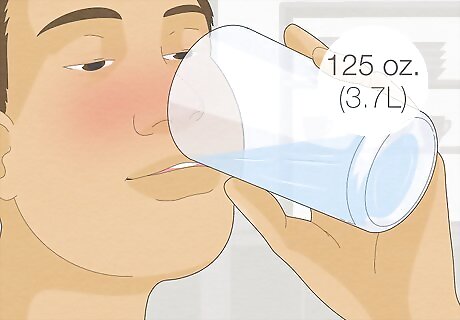
Water helps unclog your sinuses and prevents dehydration. Your body produces a lot of mucus when you have a cold, but fluids can help to thin it out so you can clear the mucus from your sinuses easier. Women should drink at least 91 ounces (2.7 liters) of water daily, and men should drink 125 ounces (3.7 liters) of water. The more fluids you drink, the quicker you can get rid of the cold. It's also important to drink plenty of fluids when you're sick to keep you hydrated. Dehydration can make your symptoms feel even worse. Limit caffeine intake when you have a cold because it dehydrates you. Don't drink alcohol. It can aggravate your symptoms and congestion and have bad reactions to your over-the-counter medications.
Sip hot herbal tea with honey.
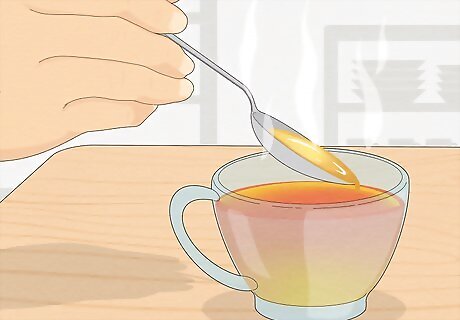
Tea with honey can soothe your sinuses and sore throat. Hot herbal tea can also make mucus easier to cough up and help ease inflammation. Chamomile, peppermint, ginger, lemongrass, and hibiscus teas are all popular and effective choices. Once you brew a cup of tea, stir in 1 teaspoon (4.9 mL) of honey and drink it for quick cold relief. Stick to black or green tea. Both contain phytochemicals that may help fight colds, and green tea may help rehydrate your body!
Eat some chicken noodle soup.
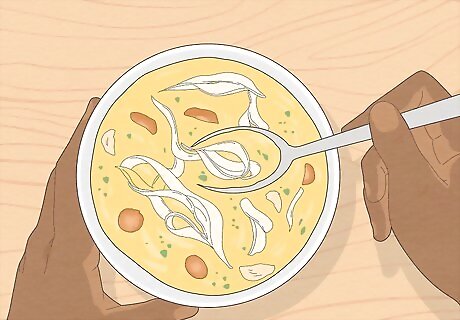
Warm broth can ease symptoms, including congestion and sore throat. Make yourself a bowl of chicken noodle soup for lunch or dinner. The steam from the soup is great for clearing up your sinuses and making your sore throat feel a little less scratchy. Plus, the soup keeps you hydrated. Some studies even show that chicken soup can reduce inflammation and may help you fight off your cold.
Take a hot bath or shower.
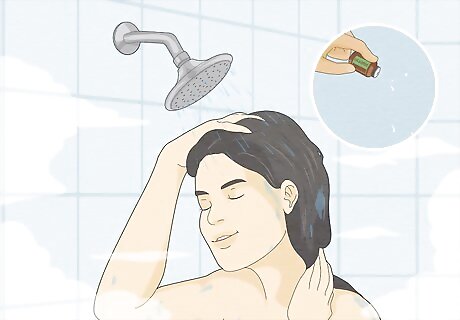
Steam from the shower will thin out the mucus in your nose. It'll also calm inflammation in your sinuses and relieve a stuffy nose. Keep the bathroom door shut to encourage more steam accumulation, and inhale the steam for 10 to 15 minutes. Baths and showers have the added benefit of helping you relax any aching muscles and unwind as well. Add a few drops of essential oil to your bath or shower. Eucalyptus, peppermint, tea tree, lavender, and rosemary oils can make steam more effective at combating congestion. Don't use peppermint oil with children under 6 years old. Also, consult your doctor before using essential oils if you're pregnant or have a serious medical condition.
Use a humidifier.
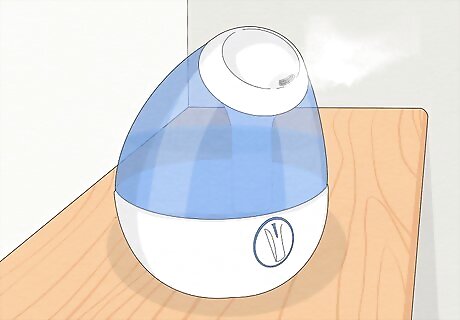
Humidifiers add moisture to the air, easing congestion and coughing. Set up a cool-mist humidifier in your room to help break up mucus, so it is not as thick. Because they ease congestion and coughing, they can also help you sleep better. Make sure you follow the directions for your humidifier and clean it properly so that it does not grow bacteria or mold.
Use saline nasal spray.
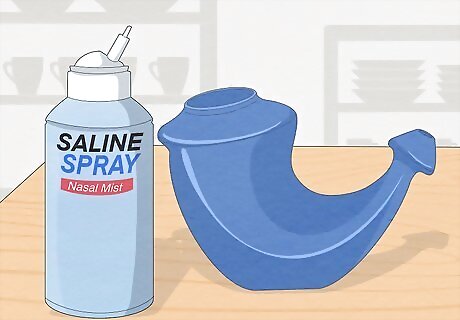
Saline (salt) solution relieves stuffiness and congestion. Nasal spray s safe to use and doesn't irritate your nasal tissues—even children can use it. Gently insert the tip of the bottle into one nostril, holding the other one closed. Squeeze the bottle, remove it, and sniff a couple of times—then do the same for the other nostril. Try blowing your nose a few minutes after using the saline nasal spray. To make your own saline rinse, boil 1 cup (240 mL) water and let it cool until it’s warm. Mix in 0.5 tsp (2.5 g) of salt and 0.5 tsp (2.5 g) of baking soda and stir until they both dissolve. For infants, put a few drops of saline solution into one nostril. Wait a moment for the solution to loosen mucus in the baby’s nose, then insert a bulb syringe .25 inches (0.64 cm) into their nostril and suction the mucus out. You can also use a neti pot, which can flush out mucus and help clear congestion from your nose.
Gargle with salt water.
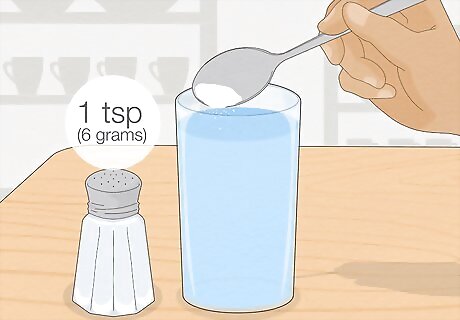
Salt water can temporarily relieve your sore throat. Pour 1 teaspoon (6 grams) of salt into 8 ounces (236.6 mL) of warm water, and stir until it dissolves completely. Then, take a sip and gargle the salt water in your mouth to reduce the inflammation in your throat and loosen mucus in your sinuses. Check to make sure the water is warm but still cool enough to drink without burning your mouth! You can also try a thicker gargle made with 50 ml of honey, steeped sage leaves, and cayenne pepper in 3.3 ounces (100 mL) of water, boiled for 10 minutes. Children under 8 years old shouldn't gargle with salt water, as they’re typically not old enough to do so. Young kids who can’t gargle yet might swallow the salt water.
Take vitamin C.
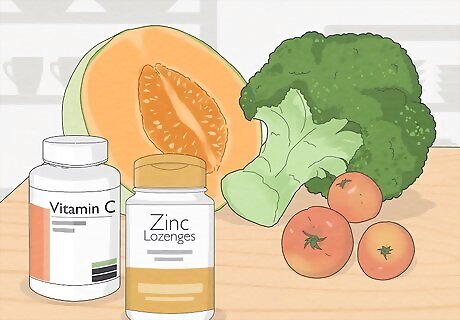
Studies show that vitamin C may reduce the length of a cold. Take up to 2,000mg of vitamin C supplements daily. Although citrus is a great source of natural vitamin C, it can also worsen a cough and irritate your throat—which is why vitamin supplements are better for colds than citrus and juice. Remember that it's always a good idea to tell your doctor before starting new supplements or vitamins! Foods rich in vitamin C that can help you while you're sick include broccoli, potatoes, tomatoes, strawberries, and cantaloupe. Zinc supplements can also help you recover quicker if you take them right when you first start feeling symptoms. However, the evidence that zinc fights colds is inconclusive (like vitamin C).
Use throat spray or cough drops.
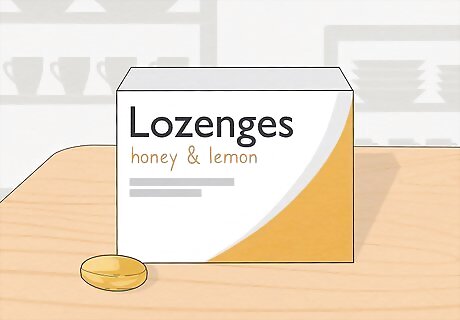
Sprays and cough drops reduce inflammation and pain in your throat. Cough drops (also called throat lozenges) come in many flavors—from honey to cherry. Some contain numbing medicines like menthol that'll get rid of a sore throat. Throat spray does the same, temporarily easing cough symptoms and numbing the pain from your sore throat. Take 1 or 2 cough drops every 2 hours as needed. Alternatively, use throat spray on the sore spot in your throat 5 times every 2 hours. You could also suck on ice or popsicles to give your sore throat some chilly relief. Be aware that some sprays can have a strong taste. Also, pick up lozenges that don't have menthol if you don't like the numbing sensation from sprays and certain cough drops.
Use over-the-counter decongestants.
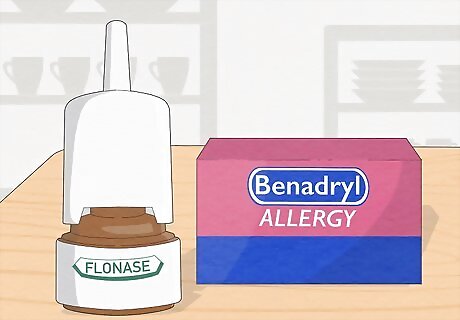
Decongestants can relieve your sinuses and stuffy nose. Congestion is no fun and may even cause your ears to ache. Decongestants (and decongestant sprays) can help relieve the pressure and swelling in your sinuses. This makes it easier to breathe through your nose and reduces your sniffles. Antihistamines can also soothe your runny nose, clogged sinuses, and sneezing. While commonly used for allergy relief, they're also recommended for congestion due to a cold. Use decongestants sparingly for no more than three days. Otherwise, your symptoms might get worse. It's important to remember that medicine can't cure a cold! Your cold will run its course no matter what, but medicine is still worth considering because it makes the symptoms less uncomfortable.
Take a pain reliever.
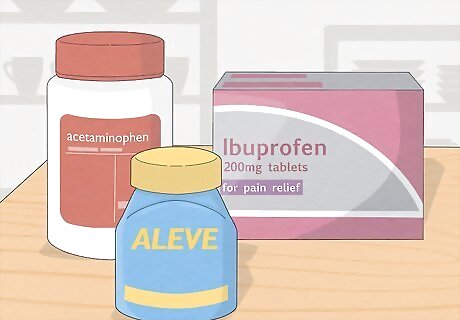
NSAIDs can help with a sore throat, headache, body aches, and fever. Acetaminophen, naproxen, and ibuprofen are all nonsteroidal anti-inflammatory drugs (NSAIDs) that you can pick up in drug and grocery stores. Choose one and take it to relieve discomfort caused by your cold, and be sure to follow the directions on the label when determining frequency and dosage. Never take NSAIDs long-term or in larger doses than recommended, as they can cause stomach issues or liver damage. Contact your doctor if you need to take an NSAID more than 4 times a day or for over 3 days. NSAIDs (except for acetaminophen) are not approved for infants under 6 months. Always check the dosages of the pain relievers for older babies and children, as some formulas are very concentrated. Don’t give aspirin to children under 12, as it puts them at risk of developing Reye's syndrome.
Use a cough suppressant.
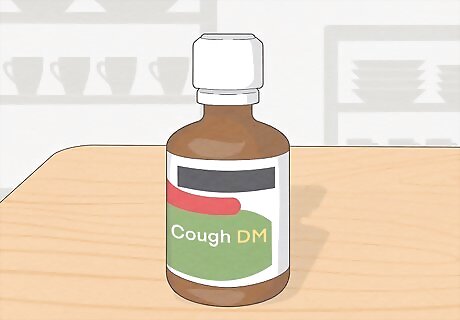
Cough medicine can make it easier to sleep without coughing. While coughing helps get mucus out of your lungs and throat, it can become painful and even stop you from sleeping. Take a cough suppressant if your cough is becoming uncomfortable. Cough medicine varieties include syrup, tablets, and spray. Always read the labels before you use a cough suppressant! Children under 6 should not use cough suppressants. Cough medicine is a temporary fix. Call your doctor if your cough doesn't go away, and you have to take it for more than 7 days. Remember only to take the medicine that you need. For example, if your sore throat goes away, but you develop a cough, you don't need to keep taking NSAIDs—just take a cough suppressant.
Get a full night of sleep.
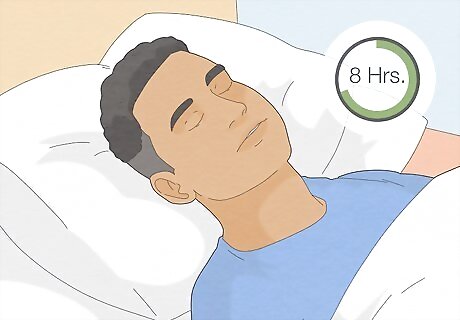
Sleep allows your body to recharge and heal faster. Get at least 8 hours of sleep at night (which most people should normally get) when you're sick. While there are many ways to relieve cold symptoms temporarily, sleep is the best way to help your body fight off the cold. So, grab some cozy pillows and blankets, close your eyes, and drift off to dreamland. Sleep in layers if your temperature fluctuates so that you can remove or add blankets depending on how you feel. Add an extra pillow to elevate your head, which might help with coughing and post-nasal drip, allowing you to sleep better. Keep a box of tissues and a trash bin or bag near your bed. This way, you can blow your nose and throw out tissues whenever necessary.




















Comments
0 comment